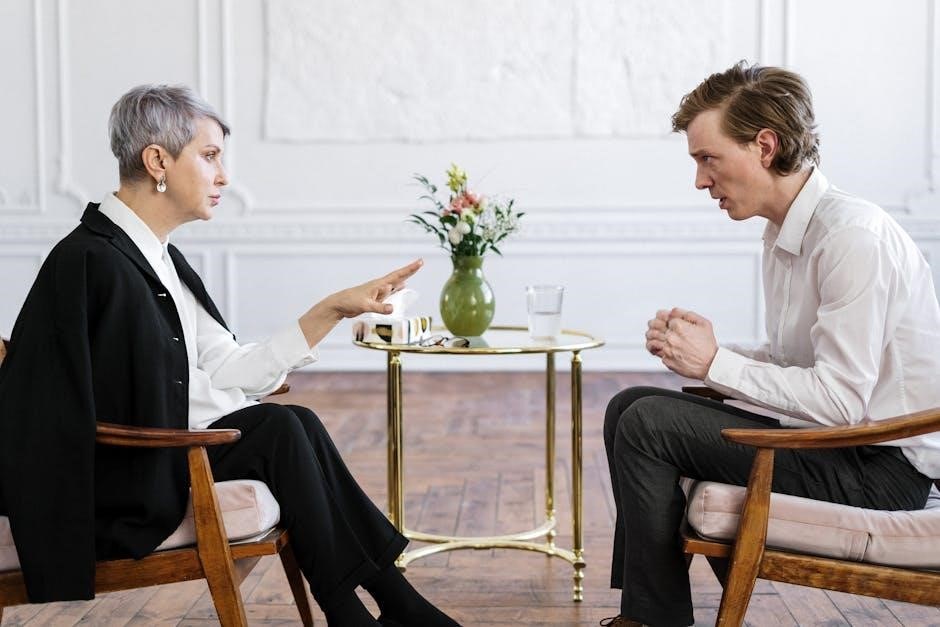couple therapy near guided journey counseling
Guided Journey Counseling offers expert couple therapy, focusing on enhancing communication and conflict resolution․ Their compassionate approach helps couples in Midland Park and Bergen County, NJ, strengthen relationships․
1․1 Understanding the Concept of Guided Journey Counseling
Guided Journey Counseling is a compassionate and individualized approach to therapy, designed to help couples navigate relationship challenges․ This method focuses on fostering personal growth, improving communication, and strengthening emotional connections․ It emphasizes identifying underlying patterns and emotional triggers that may affect the relationship․ The therapy is conducted in a supportive environment, where the therapist acts as a neutral guide, empowering couples to address conflicts and work toward meaningful solutions․ By combining structured techniques with a tailored approach, Guided Journey Counseling aims to help partners build resilience and deepen their understanding of each other․ This therapeutic model is particularly effective for couples seeking to overcome communication barriers, trust issues, or specific challenges impacting their relationship․
1․2 The Importance of Couple Therapy in Modern Relationships
Couple therapy has become a vital tool for navigating the complexities of modern relationships․ With increasing stress, busy lifestyles, and evolving expectations, couples often face challenges like communication breakdowns, trust issues, and unresolved conflicts․ Guided Journey Counseling addresses these issues by providing a safe, non-judgmental space for partners to reconnect and grow together․ This therapeutic approach not only helps couples resolve immediate problems but also equips them with tools to prevent future conflicts․ By fostering open dialogue, empathy, and mutual understanding, couple therapy strengthens the foundation of relationships, promoting long-term satisfaction and resilience․ For many, it serves as a proactive step toward maintaining a healthy, fulfilling partnership in today’s fast-paced world․
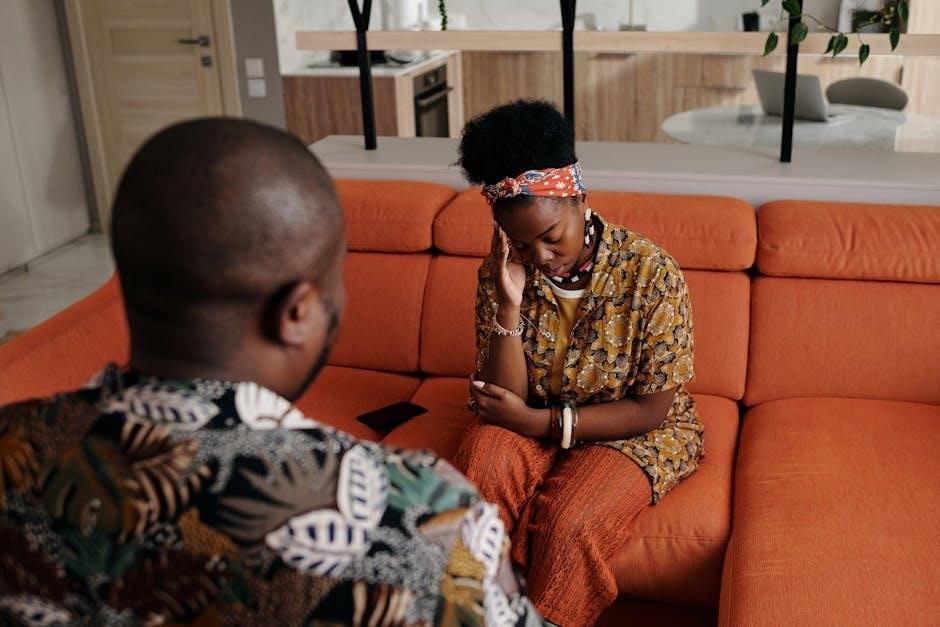
The Role of Communication in Couple Therapy
Communication is the cornerstone of couple therapy, enabling partners to express emotions, resolve conflicts, and rebuild trust․ Guided sessions provide tools to enhance understanding and strengthen relationships effectively․
2․1 Improving Communication Skills Through Guided Sessions
Guided therapy sessions play a vital role in enhancing communication skills for couples․ These structured sessions provide a safe space for partners to express emotions, listen actively, and understand each other’s perspectives․ Therapists often use practical techniques, such as active listening exercises and empathy-building activities, to help couples break down communication barriers․ By fostering open dialogue, guided sessions empower couples to address misunderstandings and develop healthier ways of connecting․ Over time, these strategies translate into improved conflict resolution and deeper emotional intimacy․ The goal is to equip couples with tools to maintain clear and meaningful communication long after therapy concludes․

2․2 Overcoming Barriers to Effective Communication
Guided therapy sessions help couples identify and address barriers hindering effective communication․ Common obstacles include unresolved conflicts, emotional triggers, and negative communication patterns․ Therapists guide couples in recognizing these issues and developing strategies to overcome them․ Techniques such as active listening, empathy exercises, and conflict resolution training are often used․ By fostering a neutral and supportive environment, therapists encourage open dialogue, helping partners express feelings without fear of judgment․ This process enables couples to break down defensive walls and replace harmful communication habits with constructive ones․ Overcoming these barriers leads to clearer understanding, reduced misunderstandings, and a stronger emotional connection between partners․
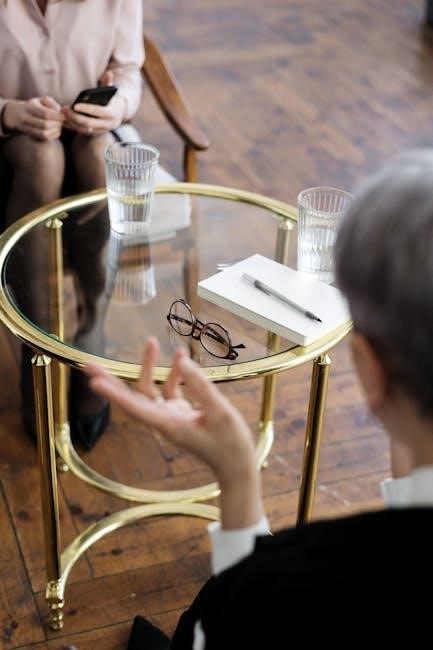
Conflict Resolution Strategies in Couples Therapy
Conflict resolution in couples therapy involves identifying underlying patterns and emotional triggers․ Therapists guide couples in understanding these dynamics and applying practical techniques to resolve disputes constructively․
3․1 Identifying Underlying Patterns and Emotional Triggers
Identifying underlying patterns and emotional triggers is a cornerstone of effective conflict resolution in couples therapy․ Therapists at Guided Journey Counseling help couples recognize recurring dynamics that fuel disputes, often rooted in unaddressed emotions or past experiences․ By exploring these patterns, partners gain insight into how their reactions may unintentionally escalate conflicts․ Emotional triggers, such as feelings of abandonment or criticism, are carefully unpacked to understand their impact on relationships․ This process encourages couples to approach disagreements with empathy and self-awareness, fostering a deeper understanding of each other’s needs and behaviors․ Addressing these underlying issues is the first step toward resolving conflicts in a healthy and constructive manner․
3․2 Practical Techniques for Resolving Conflicts

Practical techniques for resolving conflicts are essential for fostering healthy relationships․ Guided Journey Counseling emphasizes active listening, encouraging partners to truly understand each other’s perspectives without interruption․ Couples are taught to use “I” statements to express feelings without placing blame, reducing defensiveness․ Problem-focused approaches help couples identify specific issues and work collaboratively toward solutions․ Therapists also guide couples in practicing emotional validation, acknowledging each other’s feelings to create a safe environment for dialogue․ Additionally, techniques like setting boundaries and creating future-focused plans help couples move beyond past hurts․ These strategies empower couples to address conflicts constructively, building resilience and strengthening their bond․ By learning these tools, partners can navigate disagreements with empathy and understanding, fostering a more fulfilling relationship․
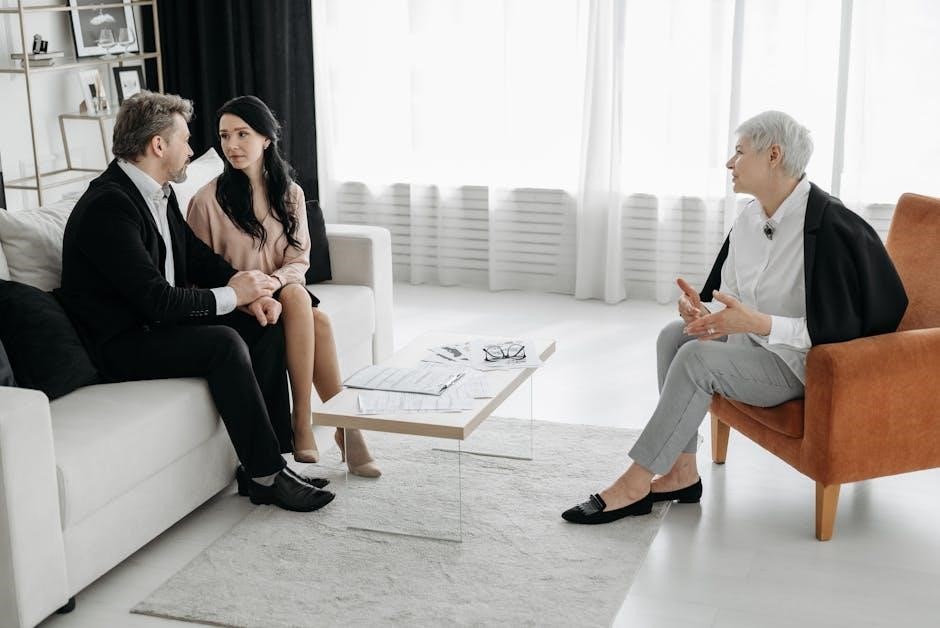
The Therapist’s Role in Guided Journey Counseling
The therapist at Guided Journey Counseling acts as a neutral guide, helping couples identify underlying patterns and emotional triggers to foster a supportive and empowering environment․
4․1 The Therapist as a Neutral Guide
In Guided Journey Counseling, the therapist serves as a neutral guide, creating a safe and nonjudgmental space for both partners to express their concerns․ They remain impartial, focusing on the well-being of the relationship rather than taking sides․ By identifying underlying patterns and emotional triggers, the therapist helps couples gain clarity and understanding․ Their role is to empower couples to take ownership of their growth, offering insightful observations and practical strategies to enhance effective communication and conflict resolution․ This approach fosters a collaborative environment where both partners feel heard and supported in their journey toward healing and strengthening their bond․
4․2 Qualifications and Experience of Couples Therapists
Therapists at Guided Journey Counseling are highly qualified and experienced in couples therapy, specializing in communication, conflict resolution, and relationship dynamics․ Each therapist holds relevant licenses and has extensive training in evidence-based techniques․ Their expertise includes addressing issues like trust, intimacy, and emotional disconnection․ With years of practice, they bring a deep understanding of relationship challenges and tailor their approach to meet each couple’s unique needs․ By combining compassion with professionalism, they create a supportive environment for growth and healing․ Their goal is to equip couples with the tools necessary to navigate life’s challenges and build a stronger, more fulfilling relationship․

Benefits of Engaging in Couple Therapy
Engaging in couple therapy enhances communication, resolves conflicts, and strengthens emotional connections․ It fosters a supportive environment for growth, understanding, and rebuilding trust in relationships․
5․1 Strengthening Relationship Bonds
Couple therapy near Guided Journey Counseling enhances emotional intimacy and trust, fostering deeper connections․ Through guided sessions, partners learn to communicate effectively, resolving conflicts and understanding each other’s needs․ The therapeutic process encourages empathy and mutual respect, helping couples rebuild and strengthen their relationship bonds․ By addressing underlying issues and promoting open dialogue, therapy empowers couples to navigate challenges together, creating a stronger, more resilient partnership; This supportive environment allows for personal and relational growth, ensuring a lasting foundation for the relationship to thrive․
5․2 Addressing Specific Challenges in Relationships
Couple therapy near Guided Journey Counseling is tailored to address specific challenges couples face, such as communication barriers, trust issues, or uncertainties about the future․ By identifying underlying patterns and emotional triggers, therapists help couples understand the root causes of their conflicts․ The therapeutic process provides practical tools to navigate these challenges effectively, fostering healthier interactions and renewed connection․ Whether it’s rebuilding trust after infidelity or resolving recurring disagreements, therapy offers a safe space for open dialogue and growth․ This focused approach ensures that couples gain the skills and insights needed to overcome obstacles and strengthen their relationship, leading to a more fulfilling and resilient partnership․

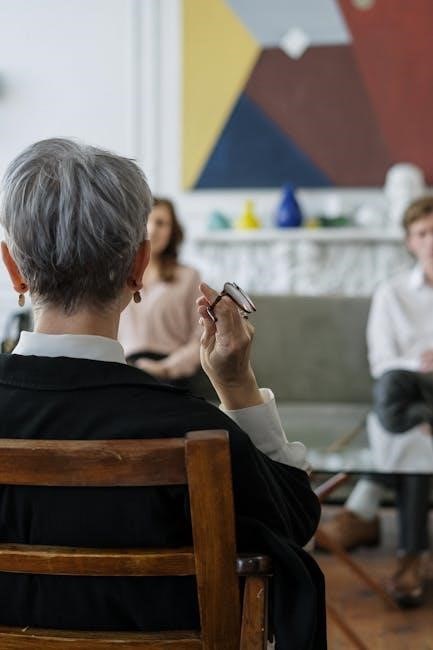
How to Choose the Right Couples Therapist
Choosing the right couples therapist involves ensuring they are licensed, experienced, and a good fit for your specific challenges․ Look for expertise in areas like communication or trust issues․
6․1 Key Factors to Consider When Selecting a Therapist
When selecting a couples therapist, consider their qualifications, experience, and therapeutic approach․ Ensure they are licensed and specialize in relationship issues․ Check their experience with challenges similar to yours, such as communication or trust issues․ Assess their therapeutic style to ensure it aligns with your needs․ Consider availability, location, and cost, including insurance coverage․ Personal comfort and rapport with the therapist are crucial for open dialogue․ Read reviews and ask for referrals to find a trusted professional․ Ultimately, choose someone who fosters a safe, non-judgmental space for both partners to grow․ Taking the time to select the right therapist is an investment in your relationship’s future․
6․2 Preparing for Your First Therapy Session
Preparing for your first couples therapy session is essential to maximize its effectiveness․ Start by setting clear, realistic goals for what you hope to achieve․ Open communication is key, so both partners should feel comfortable sharing their thoughts and feelings․ Consider writing down specific issues or concerns to discuss during the session․ Arrive early to complete any necessary paperwork and familiarize yourself with the setting․ Be honest and transparent with your therapist to ensure a productive dialogue․ Ask questions about their approach and experience to build trust․ Emotionally, prepare yourselves for open and vulnerable conversations․ Remember, seeking therapy is a positive step toward healing and growth․ Approach the session with an open mind and commitment to the process․
Couple therapy near Guided Journey Counseling offers a transformative approach to strengthening relationships․ By fostering open communication, addressing challenges, and equipping couples with practical tools, therapy can lead to meaningful growth․ The guidance of a skilled therapist creates a safe space for partners to navigate conflicts and deepen their connection․ Investing in therapy demonstrates a commitment to relationship health and future happiness․ For those seeking support in Midland Park, Bergen County, or nearby areas, Guided Journey Counseling provides compassionate and effective care․ Embrace the opportunity to heal, grow, and build a stronger bond with your partner through professional counseling․
